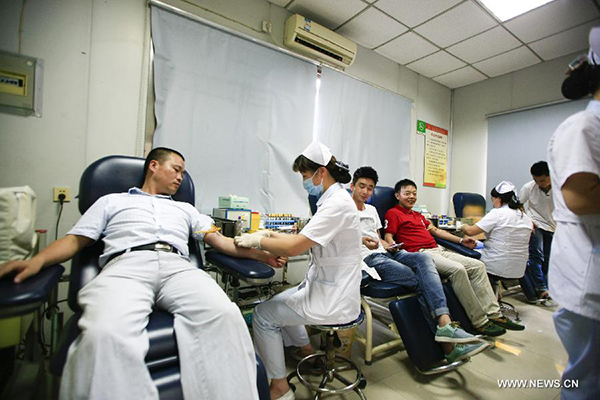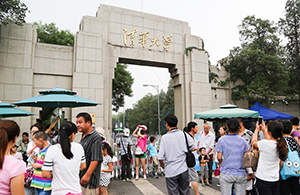Illegal blood exchanges will only end when more people become donors
(China Daily) Updated: 2016-04-28 07:31
 |
|
Local residents donate blood at a blood bank in Kunshan City, east China's Jiangsu province, Aug 2, 2014. [Photo/Xinhua] |
A number of illegal blood exchanges have been unveiled in an undercover report based in the First Affiliated Hospital of Soochow University, East China's Jiangsu province. Chinese Business View commented on Wednesday:
Although blood resources are in high demand in China, they are supposed to be untradeable. However, there are some who still manage to exploit loopholes in the system.
Due to the country's serious shortage of blood resources, hospitals are only allowed to use their blood stocks when a patient is dying, meaning that those in less critical conditions who require blood are supposed to turn to friends or relatives for blood donations.
However, many of the donors turn out to be strangers paid by the "blood dealers", who sell their donations for about four to five times higher than the regular price to patients in need.
The blood donor rate in China was about 0.95 percent of its population in 2014, less than the 3 percent needed to meet the basic needs of the country. That leaves enough room for the blood dealers to rake in huge profits in illegal blood exchanges, as patients have no choice but to pay extra money to save their lives.
This means if the off-the-record blood trade is curbed, hospitals will not have enough blood to treat all the patients who need a blood transfusions.
And in the face of stricter restrictions, blood dealers will be more careful, keeping their business under the radar, which may mean patients have to pay more for blood donations.
In other words, simply punishing the wrongdoers will not serve as a fundamental cure to the nationwide blood shortage. The priority for the authorities is to establish a transparent donation and compensation mechanism for donors to encourage more people to donate blood.
Also, more efforts have to be made to cut the red tape in both donation and use of blood, especially when the donors and receivers are not in the same city.
- Blood donor campaign attracts brothers in arms
- Volunteers respected on World Blood Donor Day
- Campaigners strip down for blood donor appeal ahead of the Olympics
- A blood donor
- Farmers resort to new cash crop: blood
- More than 1,200 Hechi teachers and students donate blood
- Xi urges production safety after 'blood lessons'

I’ve lived in China for quite a considerable time including my graduate school years, travelled and worked in a few cities and still choose my destination taking into consideration the density of smog or PM2.5 particulate matter in the region.











